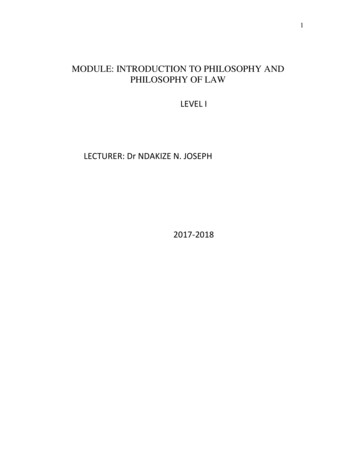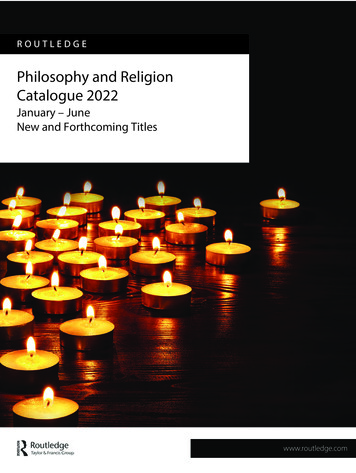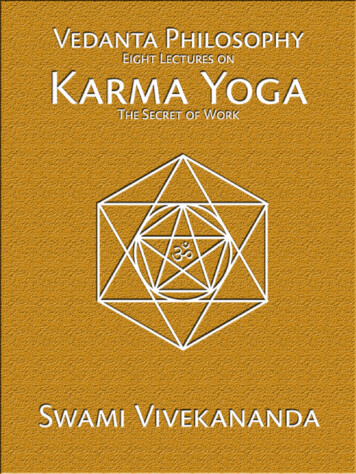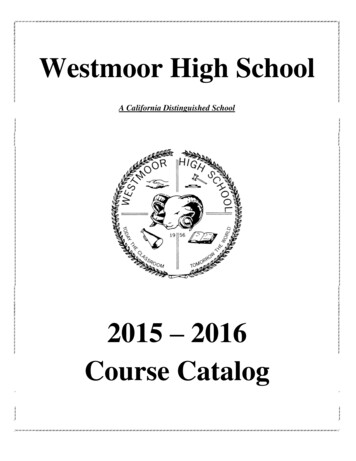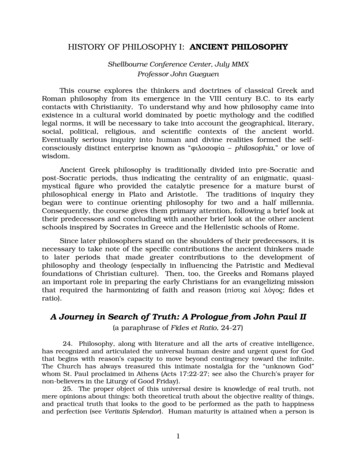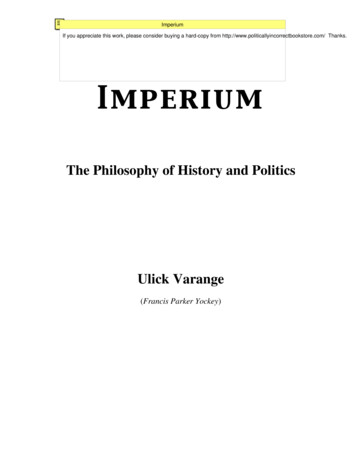
Transcription
The Philosophy of History and PoliticsUlick Varange(Francis Parker Yockey)
IMPERIUMMuch has been said already about this unique and disturbing book, but this much is reasonablycertain: A thousand times more is yet to be said.Imperium is the first sequel the literary world knows to Spengler’s monumental The Decline of theWest.In fact, the author of Imperium does more than even Spengler attempted— he defines and creates thepathology of Culture in all of its infinitely urgent importance, including the discipline of CulturalVitalism.Imperium rejects the Nineteenth Century: the parched fossils of its thought— Marx, Freud and thescientific-technical world outlook; its exhausted political nostrums— the pluralistic state, liberalism,democracy, communism, internationalism; all of which fail to satisfy the organically vital realities ofpolitics.Imperium presents unique and almost esoteric political, social and historical definitions andexplanations which shall become more widely known— indeed, commonly understood— if our Westsurvives.Imperium is probably the first book to advocate European unification— to dogmatically predict it— interms other than the crassly materialistic.Imperium is the first comprehensive and profoundly constructive alternative to the Marxist-liberaldegeneracy surrounding us.Imperium is the creation of a man who believed in his Destiny— and in this book— so thoroughlythat he became a martyr to it.Imperium is written with a dramatic style and flair for expression seldom encountered even in novels.Yet rising above all else is the simple fact that in Imperium a creative genius has given the worldsomething new: A fourth dimension of intellect and a new concept of spirituality. Imperium heralds thedawn of a new day of Faith.Among all books, therefore, Imperium has a distinct status. Hardly a man alive will agree with all itcontains, yet will not find his personal horizons extended by the reading of it.The original two volumes are here combined, unabridged, into one, with a brilliant Introduction by Dr.Revilo P. Oliver.
To the hero of the Second World War“Was mich nicht umbricht, macht mich stärker.”- NIETZSCHE
IntroductionDimly, I could make out the form of this man— this strange and lonely man— through the thick wirenetting. Inwardly, I cursed these heavy screens that prevented our confrontation. For even though ourmutual host was the San Francisco County Jail, and even though the man upon whom I was calling waslocked in equality with petty thieves and criminals, I knew that I was in the presence of a great force, andI could feel History standing aside me.Yesterday, the headlines had exploded their sensational discovery. “MYSTERY MAN WITH THREEPASSPORTS JAILED HERE,” they screamed. A man of mystery— of wickedness— had been captured. Aman given to dark deeds and— much worse— forbidden thoughts, too, the journalists squealed. A manwho had roamed the earth on mysterious missions and who was found to be so dangerous that his bail wasset at 50,000— a figure ten or twenty times the normal bail for passport fraud. The excitement of thenewspapers and the mystery of it all seemed to indicate that this desperado was an international gangster,or a top communist agent.At least, this is what the papers hinted. But I know now that it erred in many ways, this “free press” ofours.I know now that the only real crime of Francis Parker Yockey was to write a book, and for this he had todie. It is always impossible, of course, to come to grips with the essence of greatness. There are the knownfacts of a great life, but facts are dead and almost mute when we seek the essential reality of a creativepersonality. But let us review some of the facts we know of a life which is at once significant, fascinatingand tragic.Francis Parker Yockey was born in Chicago in 1917. He attended American universities, taking a B.A.degree in 1938 and, three years later, a degree in law from Notre Dame, where he was graduated cumlaude.From earliest childhood, Yockey was recognized for his prodigious abilities, and resented for them bymany. History may reveal that the combination of originality and high intelligence in rare individuals isessential for human progress, but we mortals find these qualities more admired in biographies than inclassmates, friends and underlings.Yockey was a concert-level pianist; he was a gifted writer. He studied languages and became a linguist.As a lawyer, he never lost a case. He had an extraordinary grasp of the world of finance— and this issurprising, for we learn that in his philosophy economics is relegated to a relatively unimportant position.And it is as the Philosopher that Yockey reached the summit; it is this for which he will be remembered;he was a man of incredible vision. Even so, his personality was spiced by the precious gift of a sense ofhumor.Like the great majority of Americans, Yockey opposed American intervention in the Second WorldWar. Nevertheless, he joined the army and served until 1942 when he received a medical discharge(honorable). The next few years were spent in the practice of law, first in Illinois and subsequently inDetroit, where he was appointed Assistant County Attorney for Wayne County, Michigan.In 1946, Yockey was offered a job with the war crimes tribunal and went to Europe. He was assignedto Wiesbaden, where the “second string” Nazis were lined up for trial and punishment. The Europe of1946 was a war-ravaged continent, not the prosperous land we know today. Viewing the carnage, andPage i
seeing with his own eyes the visible effects of the unspeakable Morgenthau Plan which had as its purposethe starvation of 30 million Germans, and which was being put into effect at that time, he no doubt foundample reinforcement for his conviction that American involvement in the war had been a ghastly mistake.And feeling the might of the sinister power in the East, he might well have wondered whose interestswere being served by such a “victory.”As Senator Robert A. Taft and many other responsible and thinking men of the day who had thecourage to state their convictions, Yockey concluded that the entire procedure of the “war crimes trials”was serving the interests— and was meant to serve the interests— of international communism. The useof torture, doctored evidence and ex-post-facto law before a court which was judge, jury, prosecutor anddefense were merely part of the preposterous juridical aspects. Of even more importance was thereversion to barbarism which was inherent in the spectacle— a reversion so pointedly explored later byBritisher F. J. P. Veale in Advance to Barbarism.For eleven months, Yockey’s duty in Wiesbaden was to prepare reports on the various cases. Having along view of history, he tried to do an objective job. Finally, in Washington, someone complained, andhis superior called him on the carpet. “We don’t want this type of report,” he was told. “This has entirelythe wrong slant. You’ll have to rewrite these reports to conform with the official viewpoint.”Yockey felt that the time had come to take a stand, even if it meant to break with conformity and plungeinto the lonely waters of social ostracism. “I am a lawyer, not a journalist,” he said, “you’ll have to writeyour own propaganda”; and he quit on the spot.After Wiesbaden, he returned to America for five months. But following this taste of weltpolitik he wasunable to settle down. He could not ignore an insistent feeling that he must immolate himself in theflames of controversy. And this conviction so destroyed his peace of mind that he knew he had no choice.It was late 1947 when Yockey returned to Europe. He sought out a quiet inn at Brittas Bay, Ireland.Isolated, he struggled to begin. Finally, he started to write, and in six months— working entirely withoutnotes— Francis Parker Yockey completed Imperium.The formidable task of publishing it was the next step. Here, also, Yockey ran into serious problems,for no publisher would touch the book, it being too “controversial.” Hungry publishers of our advancedday know that any pile of trash, filth, sex, sadism, perversion and sickness will sell when wrappedbetween two gaudy covers and called a book, but under no circumstances may they allow readers to comeinto contact with a serious work unless it contains the standard obeisances to the catchwords of equality,democracy and universal brotherhood.Finally, however, Yockey was able to secure the necessary financing, and production began.The first edition of Imperium was issued in two volumes. Volume I has 405 pages and three chapters.Volume II has 280 pages and also three chapters. Both were published in 1948 in the name of WestropaPress. Volume I was printed by C. A. Brooks & Co., Ltd. and Volume II by Jones & Dale— both ofLondon. Both volumes measure 5 x 7 1/4 inches in dimensions and have a red dust jacket with the title inblack script on a white held. The cover of Volume I is tan and that of Volume II is black.It is known that 1,000 copies of Volume I, but only 200 copies of Volume II, were finished. Thediscrepancy in quantity and the change in printers point to the difficulty in financing the job. Copies ofthe first edition are, of course, virtually unobtainable today.The rarest combination in man is that of the philosopher and man of action. When Yockey tried hishand at political organization he proved that he was no exception to the rule— or was it that the timesthen were too out of joint with the future for a constructive movement to be started? Organizing theEuropean Liberation Front in 1949, he and friends issued a manifesto called The Proclamation of London.But outside of getting beaten up in Hyde Park, nothing much happened. And here again he encounteredthe old trouble. Even among the forward-looking intellectuals and individualists who were his coworkers, his brilliance shone through. He was resented, and the effort soon collapsed.Page ii
His money and immediate hopes gone, Yockey procured a job with the Red Cross. He resigned in 1951and traveled throughout Europe.In 1952 the State Department refused to renew his passport. Repeatedly, he applied; each time he wasrejected. A game then developed between the FBI and Yockey, for the FBI had received orders to keephim under surveillance at all times. This is a pattern which has since become obvious to vigorous anticommunists in all parts of the United States, especially in the South. When Yockey’s whereabouts wasknown, the FBI would watch him night and day. When he dropped temporarily from sight, as he didfrequently, his friends and relatives and contacts were constantly interrogated by agents who— they keptrepeating— “just want to talk to him.”And this was undoubtedly the truth. This is all they wanted to do. They just wanted to know where hewas, what he was doing, whom he was seeing, what he was saying and where he was going next.Why, you ask? Why all the interest in Francis Parker Yockey, author? He himself gave the answer to afriend. “My enemies have evaluated me better than my friends,” he said, and it was true. And as I peered through the thick screens in the San Francisco Jail, and made out the indefinite shape onthe other side, that tenth day of June, 1960, I knew that I would have to help the prisoner as best I could. Icould do nothing else.I have read your book, I said to the shadow, and I want to help you. What can I do?Wait, he said. Wait, and do as your conscience tells you.The following week was full of news of Yockey’s appearance before Rabbi Joseph Karesh, the U.S.Commissioner.Twice, I attended the hearings, and each time was fascinated by this man, Yockey. In stature he wasabout five feet, ten inches. He was light of weight, perhaps 145 pounds, and quick on his feet. His hairwas dark, and starting to grey. The expression on his face— pensive, sensitive, magnetic— this was theunforgettable thing. It was his eyes, I think. Dark, with a quick and knowing intelligence. His eyesbespoke great secrets and knowledge and such terrible sadness. As he turned to leave, one time, thoseeyes quickly searched the room, darting from face to face with a sort of desperation, though theexpression on his face of a determined resignation never wavered. What was he looking for? In thatlions’ den, what else but a friendly countenance? As his gaze swept across, and then to me, he stoppedand for the space of a fractional second, spoke to me with his eyes. In that instant we understood that Iwould not desert him.Friday morning, June 17, I arose as usual. I heard the radio announcer pronounce words that stunnedme.Yockey was dead.“I’ll sleep through ‘til morning” was the cryptic message he gave his cellmate, last night. Was themorning he anticipated the dawn of a new age?A garbled note was found. The coroner declared it suicide and said the poison was potassium cyanide.No one knew where he had gotten it. The case was closed.As Americans, we have been taught from infancy to believe that we live in a free country. But timeschange, and America has become transformed in many ways. Often, the old formalities are observed, butthe meaning and inner reality of America has changed, and no one saw this more clearly than FrancisParker Yockey. How the press, for example, loves to brag to its victims— its readers— about itsfreedom. Yes, the press may be free to lie and distort and suppress and deceive and malign, but is it freeto tell the truth?Page iii
The spectacle of a man being persecuted, framed and driven to his death simply because he wrote abook is not one we would expect to see in the Twentieth Century in the land of the free and the home ofthe brave.But are we free when an American citizen whose only crime was to write a book is denied a passport bythe State Department— a privilege which is given to all but the most notorious degenerates and criminals?It was not until April 24, 1962 that the State Department finally got around to beginning hearings to denypassports to the most important communists— but the “free press” somehow forgot to report at the timethat no report of a confidential nature from the FBI or any other source would be used against acommunist unless he was given the “right” of confrontation with his accuser. And, of course, the right ofappeal would be scrupulously honored, even then.Are we free when a citizen can be arrested without a warrant and held in jail without charges, but withthe fantastic bail of 50,000 levied against him? Are we free when the vultures of the “frees press” canswoop down upon the victim to heap calumny and scorn upon his head and accuse him of doing things henever did and saying things he never said in an effort to build up “public opinion” against him? IsAmerica a free country when a sensitive genius can be held in the filthiest of jails with Negro and Whitecriminals and is denied even clean clothes and a bath? Are we free when such a “criminal” is not allowedto see his sisters in private, and when a group which has supposedly been set up to defend theconstitutional rights of citizens— the American Civil Liberties Union— would rather defend the “rights”of homosexuals, traitors, murderers and pornographers than a sincere patriot like Francis Parker Yockey,whose every thought and effort was in behalf of his fellow man? Are we free, I ask, when a judge canrule that a prisoner is not to have a “speedy and public trial by an impartial jury ,” as guaranteed in theBill of Rights, but, instead, must have a mental examination for the obvious purpose of eliminating a jurytrial altogether? And finally, are we free when another group— vastly more powerful than the ACLU orthe government itself— so powerful, indeed, that men dare not speak its name above a whisper, unless interms of the most groveling praise— are we free when this group is able to dictate to the government theexact procedure which is to be used in disposing of troublemakers like Francis Parker Yockey?If such things as I have enumerated can happen— and they did— then our vaunted “freedom” is a fakething; an empty word given to us by our watchful masters to keep us amused and quiet— as a parent givesa shiny bauble to a child.It is enlightening to review the standard means whereby our masters combat positive ideas andmovements. There is a pattern in such tactics which constructive forces will do well to study. The firsttactic is suppression and determined non-recognition of the rebel and his works. The press willunanimously give the well-known “silent treatment.” Even at this early stage, if the movement givespromise of becoming significant, assassination is considered and carried out if possible. The murder ofyoung Newton Armstrong, Jr., in San Diego, on the night of March 31, 1962, is a case in point. Quotingfrom Che Guevara’s book on guerrilla warfare and the question of when to resort to assassination:“It is generally against the policy of the Communist Party to resort to assassination However,it requires two criteria and a high-level policy decision The criteria for the individual inquestion are that he must be highly effective and it mast serve some sort of example— some sortof a highly effective example.”The next tactic is the Smear through libel, distortion, misrepresentation and the sowing of confusionwherever possible. This may be a negative smear with the purpose of destroying the effectiveness of anenemy or a positive smear for the purpose of building a haze around the truth to enable a disintegrativemovement to develop. The falsification of the truth about Castro, which was indulged in by virtually allof the press and, of course, the State Department, is a classic example of this. The Smear is usuallystarted as an underground whispering campaign that viciously builds up to an outright and overtcampaign, with the “free press” called into play. The object is to isolate enemies of the present regimeand discredit them. The third tactic is infiltration into the movement and/or the building up of falsePage iv
leadership in order to sabotage the movement at the optimum time, meanwhile diverting patriot energiesinto harmless or controlled activities. The fourth and final stage is called upon only as a last resort, afterthe movement or philosophy has become institutionalized and is immune to grosser tactics. This is to“interpret” it so as to bring it as closely as possible into conformity with approved patterns.(Characteristically, the conflicting philosophies of both Jesus Christ and Friedrich Nietzsche havesuffered this deadening interpretation.) Two or more of the above maneuvers are usually usedsimultaneously. For instance, in addition to the suppression of his Imperium,Yockey was also victimizedby the Smear; and he was also in danger of assassination— and his enigmatic end settled the problem.Now it is with no gift of prophecy that one may predict that this present republication of his work will callforth the same sequence.I tell you that the injustice of it all is enough to drive one mad. How can a man stomach the cynical orignorant drivel of the liberals as they whine for “freedom of speech” and “right to dissent” and shaketheir bony fists at “conformity” and all the rest of their legerdemain when one knows that these moralcripples and ethical perverts demand their peculiar freedoms only for those who are working to destroythe West? We have seen their reaction when one committed to saving the West is in need of some of theirmedicine.It was like a certain wise, old reporter whispered to one of Yockey’s sisters as she slumped tearfully andquietly in her solitude. “Your brother is a martyr— the first of a long line of them if we are to take backour country from those who have stolen it from us.”A surprising word on the Yockey affair came some weeks after his death, and was provided by the tightlipped silence of the man who had been charged with railroading him to the insane asylum, the UnitedStates Attorney. Suddenly, inexplicably, he resigned his job, left his wife and children and joined amonastery.Let us assume that at least one devoted servant of the Democracy has a conscience, even if displayed alittle late. Please allow me to expose to you my prejudice so that there will be no misunderstanding. I favor thesurvival of our Western cultural organism. I love those who fight for the integrity of the West, whoeverthey may be. And, as much as I fear and mistrust the outer enemies of the West, I despise our innerenemies and the cowards who support them far more— and I hate their putrid doctrine that calls ourcontinuing degradation “inevitable.”Further, I believe that the West can survive. It all hinges on faith: faith in our future; faith in oursuperiority and survival. Skepticism, sophistication, cosmopolitanism, cynicism has destroyed the oldfaith, and it has not been replaced by a new one. But faith is and will always remain the essentialingredient in every historical force. Only a unifying faith can provide the common motivation forsurvival— the just and deep conviction of our right to live— and spark the single-minded and intolerantpower which can clean and redeem our fast-decaying, rotting milieu. Very simply: the imperative ofinspiring that faith is the central problem of our time.And when I say, “survive,” I mean nothing more. For we are so far gone; our philosophies, liberties andcultural patterns are so perverted or eroded that bare survival is all that is possible. I mean to say thatthose who are to save the West must realize at the outset that only part of it can be saved; that much mustbe sacrificed and that the resulting structure will be different from the past. Those who have gone beforehave allowed the dank “winds of change” to corrode the old life, and many weeds have sprung up whichcannot entirely be eliminated. It is one thing to fight for an attainable ideal, but another to sacrifice for alost cause. In determining what is attainable and what is forever lost a philosophy of history is needed.Page v
And although our job is to rebuild we must not lose sight of the reality, for we cannot rebuild until wehave captured. Political power is the essential criterion, not wishes or windbags; and to the goal ofpolitical power all else must be temporarily sacrificed. To say less is to insure defeat. He who is onboard a sinking ship in a storm may be required to throw all his possessions overboard if this is necessaryfor common survival. Or, to use another image: Those who would guide the West back across the Styxand out of the dark must travel first through the gates of Hell.The practical problem of the recapture of political power divides itself into other questions. For one, isit possible to formulate an ethic and faith which, in itself, offers at least as much popular attractiveness asthe painted lie of Marx? For another, how can those who would naturally lead such a movement competewith the highly-developed Leninistic operational diabolism in the perpetually savage and untamablejungle of political warfare— or is it necessary to do so? After all, the conspiracy we face is the hideousmonster spawned of four millenniums of experience in guile and deception; so much so, in fact, that itsmain ally always has been the obtuse blindness of those on whom it feeds. “Struggle” to a man of theWest means bullets, armies, and aircraft carriers. But to our enemy, international wars are of littlemeaning; “struggle” to him means not war but politics, and accordingly he has perfected his weapons inthis most decisive of areas. Soldiers have never made good politicians, and, by the nature of theirrespective crafts, the soldier must always lose to the man of politics.Finally comes the main consideration in formulating such a doctrine: will it certainly eradicate thepolitico-social evils and diseases of our day and lead mankind toward a better world?It is by this standard and no other that you will, if you are wise, judge the work of Francis ParkerYockey.To quit the search for such an ethic is to abandon history like the intellectual and spiritual nihilists— theliberals and beatniks. To quit the search is to turn over to the inner enemy carte blanche control over ourlives, souls and fate.The failure to provide this philosophy is not alone the fault of the saprophytes among us, however. Noris it only the fault of the chameleon-like inner enemy of the West (the Culture Distorter, to use Yockey’sapt term) which mercilessly persecutes and smashes all who dare to cry out against our rapid decline anddegeneration; in all truth, it is mainly the fault of the many thousands who fully know the issues at stakeyet have not the moral courage to identify and fight the Culture Distorter; or— worse yet— who have, bydiligent self-persuasion, convinced themselves that the battle for survival against an enemy that demandsnothing less than total surrender can be fought and won with tax-deductible corporations, measured,“moderate” words and avoidance of “extremists.” These dainty combatants swarm over every anticommunist movement like ants on sugar. By shrilly demonstrating their anti-communism they bribe theirconsciences to give them peace and often go so far as to join in the crucifixion of those few with moralcourage lest they, too, be adjudged “guilty” by association. America has too many of such anticommunists and too few real patriots.There is much in Imperium which can be easily misinterpreted. There is something for everyone toagree with. And there is something for everyone to disagree with. This is a distinguishing characteristicof every truly vital and revolutionary departure.Yockey’s criticism of Darwinism is an example of the first possibility, and it should be borne in mindthat he is speaking of journalistic Darwinism, not the theory of evolution. A related point is his usage ofthe word, race. It would have added to clarity if another word, such as nobility, was used to describe thosewho feel the Imperative of the Age, for the genetic interpretation of race is a necessary, useful and validone if we are to see all of our problems clearly and accurately. Also, Yockey cites some tests of doubtfulvalidity when he asserts that children of immigrants into America are quite different in anthropologicalmeasurements than their parents. There is no doubt some truth to this; there are bodily differences causedby food and climate, but such conclusions can be carried into the realm of Lysenkoism unless greatcaution is used. Troyfim Lysenko is the Russian communist quack and high priest who “proved” throughPage vi
his hocus-pocus that environment and not heredity creates the man. Such a theory is the basic fallacyupon which the entire communist theory of man rests, though few people realize this. But heredity is amatter of genes and genes never change except through mutation unless genes of one type (race) aremixed with genes of another type (race). One of the best books on the subject to appear recently is Dr.Conway Zirkle’s Evolution, Marxian Biology and the Social Scene. Evolution, biology and geneticinheritance must be treated as matters of life-facts, and any theory for the future has to accept them.Yockey’s usage of the word authority may be a source of misinterpretation. It should be rememberedthat the individual enjoyed far more liberty in Europe under the monarchs than in America, today.Doubters should familiarize themselves with Edmund Burke, Thomas Carlyle, Herbert Spencer, and themore recent work of Otto von Habsburg, The Social Order of Tomorrow. It is sure that by the use of thisword, he does not mean Marxist-type collectivization.Some readers have raised the question of Yockey’s apparent anti-Russianism, and a clarifying word isnecessary here. In later writings, Yockey made his views on Russia more clear; in fact, certain of hiscaptors called him “anti-American and pro-Russian,” during his San Francisco ordeal. Although this libelwas of course vomited for the benefit of gullible newspaper readers, it shows that some of his laterwritings could have been misinterpreted as being pro-Russian, just as Imperium indicates an anti-Russianattitude. Of course, Yockey was neither pro- nor anti-Russian; he was concerned with the health andcontinuity of the West, and his view of the rest of the world was at all times subjective to what heconsidered in the best interests of the West at that time.Accusations of “anti-Semitism,” unless the imprecation is meant as simply having an open mind on theJewish question, should be interpreted on the same level. The fact that he was captured in the home of aJewish friend— even though that friend subsequently repudiated him— is instructive to the truth here.Comment could be made on dozens of the brilliant thoughts and concepts presented in Imperium, suchas, for one example, his relegating economics to its proper level— organically, the alimentary tract. Hisadvocacy of European unification, long before this idea had gained any headway, is another case in point.This is perhaps a proof of his assertion that things that are considered “extreme” today are the dogmas oftomorrow; the genius lives in the future, as he says, and whereas he used to be considered merely a little“odd” by his contemporaries, and avoided or tolerantly humored (unless, that is, he incurred the righteouswrath of the Church, in which case things could be made very hot for him) he is today declared bymodern Freudianism to be mentally ill and unfit for the ancient protections of law; and this is surelyindicative of the “progress” we have made in a thousand years.The significance of the pseudonym Yockey chose as author of Imperium, Ulick Varange, should benoted. Ulick is an Irish given name, derived from Danish, and means “reward of the mind.” Varange, ofcourse, refers to the Varangians, that far-roving band of Norse heroes led by Rurik who, upon invitationfrom the Slavs, came to civilize Russia in the 9th Century, built the Russian Imperial State and formed thegifted and handsome
Among all books, therefore, Imperium has a distinct status. Hardly a man alive will agree with all it contains, yet will not find his personal horizons extended by the reading of it. The original two

